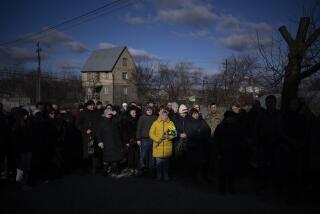Worldwide Quake Help Pouring Into Armenia : Soviets Overwhelmed by Show of Concern
- Share via
LONDON — West European countries Saturday overwhelmed Soviet authorities with assistance to Armenian earthquake victims in an unprecedented outpouring of concern for a natural disaster in the Soviet Union.
Cash donations, medical supplies, rescue teams, heavy earthmoving equipment and dogs trained to help find those still buried in the rubble had either arrived or were on their way to Soviet Armenia from a variety of official and private sources, mainly in Europe but also from further afield.
Even Israel and South Korea, two nations which have no diplomatic relations with the Soviet Union, offered to help.
Donation Pledged
In Rome, Pope John Paul II sent a message of personal sympathy to Soviet leader Mikhail S. Gorbachev, expressing his concern for the earthquake victims and pledging a $100,000 donation to support relief work in the stricken region.
The pontiff rarely sends personal messages to world leaders on such occasions, instead usually offering condolences through local church leaders.
In addition to individual European governments, the European Communities pledged $500,000, and a spokesman in Brussels said Saturday that three aircraft loaded with medical supplies and teams of doctors would depart this weekend from Belgium and the Netherlands.
The assistance follows the first-ever Soviet call to the West for help in dealing with a natural disaster.
Public Response Overwhelming
But if the generous official response from Western governments has surprised Soviet diplomats in Europe, the groundswell of public involvement has clearly overwhelmed them.
The depth and visible warmth of this response is one of the clearest indicators yet of the dramatic shift in public perceptions in Western Europe of the Soviet Union during the Gorbachev era.
It also provides a strong indication of just how well Gorbachev’s conciliatory U.N. speech last Wednesday was received by America’s European allies.
Despite officials’ efforts in many countries to discourage euphoria, both the tone of that speech and Gorbachev’s pledge to cut the Soviet armed forces by 500,000 troops within two years has been interpreted by many in Europe as a watershed in East-West relations.
This sense of a new warmth helped spur the desire in Western Europe to assist the Soviet earthquake victims.
Private Jet Dispatched
In Britain, no fewer than four public appeals have been launched in the past 48 hours for the earthquake victims, including one by the YMCA and one by newspaper baron Robert Maxwell, who promptly loaded his private jet aircraft with medical supplies and dispatched it to the Armenian capital of Yerevan.
“We’ve taken in several thousand pounds in the last two days,” a spokesman for Maxwell’s Mirror Group Newspapers said of the cash donations that have poured in.
Television cameras Saturday crowded into the headquarters of the Moscow Narodny Bank in London’s financial district to film bank officials working on their day off fielding an avalanche of telephone calls from members of the public offering donations.
“We have gotten everything from 500-pound checks ($900) to jars of pennies from small children,” declared the bank’s chairman, Alexander Maslov, shaking his head.
After its main evening newscast Friday, the British Broadcasting Corp. flashed telephone numbers for credit card donations for relief aid. No figures are available, but relief workers reported that the lines have been jammed.
Members of the public were asked not to take blankets and clothing directly to the hangar at London’s Heathrow Airport being used as a staging area but instead to deliver them to local relief agencies to handle.
Urgently Needed Items
Responding to this public spirit, the Soviet Embassy in London on Saturday put out a list of urgently needed items, including antibiotics, disposable syringes and air pressure beds for handling victims with multiple bone fractures.
Prime Minister Margaret Thatcher, who had been scheduled to host Gorbachev on a three-day official visit here until Wednesday’s earthquake forced a postponement, had earlier announced $8 million in emergency aid. Her minister for overseas development, Christopher Patten, declared: “We stand ready to provide any assistance that is required.”
Within hours of hearing a plea for earthmoving equipment, two bright yellow British-made earthmovers were shown on television being loaded onto a cargo plane at Stansted Airport, east of London.
In Bonn, Chancellor Helmut Kohl on Saturday thanked members of the public for spontaneous donations and urged relief organizations to respond generously to the Soviet call for help.
The West German Red Cross immediately pledged $1.1 million.
‘Never Anything Like This’
“There’s never been anything like this,” commented a Foreign Ministry official in Bonn.
The West German government has already sent blood plasma, tents, blankets, three tons of medical supplies and teams of rescue workers with dogs trained to locate victims trapped beneath wreckage.
In Paris, Soviet human rights activist Andrei D. Sakharov appeared live on French television and urged international assistance for Armenia. French viewers watched as he was shown film footage of the disaster for the first time.
Visibly moved, Sakharov called the disaster “a terrible thing.”
Sakharov was in Paris to attend events marking the 40th anniversary of the U.N. Universal Declaration of Human Rights.
The official French response to the Armenian disaster was swift.
Mitterrand’s Offer
Thursday, President Francois Mitterrand sent a senior aide to the Soviet Embassy in Paris to ask what could be sent.
Friday morning, a C-130 military aircraft departed for the Soviet Union with 147 rescue workers and a team of 22 doctors. A second aircraft with more rescue teams and medical supplies departed 12 hours later.
French Premier Michel Rocard went to the airport to personally see off the rescue teams.
Within hours of their arrival, the first French team, using rescue dogs and infrared devices, found and helped save 60 people who had been trapped in the town of Leninakan.
More to Read
Sign up for Essential California
The most important California stories and recommendations in your inbox every morning.
You may occasionally receive promotional content from the Los Angeles Times.









